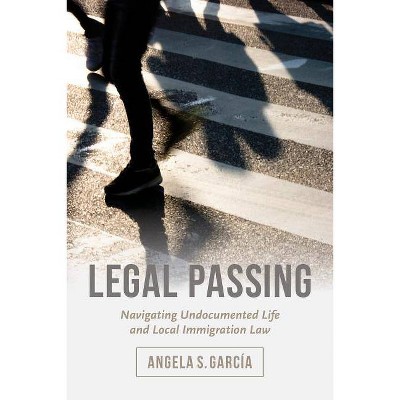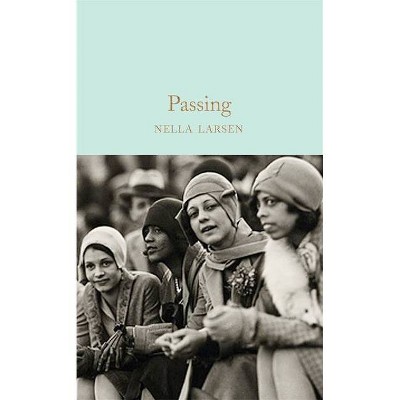Legal Passing - by Angela S García (Hardcover)

Similar Products
Products of same category from the store
AllProduct info
<p/><br></br><p><b> About the Book </b></p></br></br>"Legal Passing offers a nuanced understanding of how undocumented Mexicans constantly negotiate the vexed conditions of their US receiving locales as shaped by a spectrum of federal, state, and local immigration measures. Leveraging differences between cities and states that accommodate immigrants and those that aim to drive them away, Garcâia shows that undocumented Mexicans in restrictive locations are not more likely to leave, but, instead, learn to pass as 'legal' by carefully choosing how to dress, where to travel, when to speak, and even what to name their children. Legal Passing combines social theory on race and immigration with place and law, using interviews, surveys, and ethnography to show the everyday failures and long-term human consequences of anti-immigrant legislation"--Provided by publisher.<p/><br></br><p><b> Book Synopsis </b></p></br></br><i>Legal Passing</i> offers a nuanced look at how the lives of undocumented Mexicans in the US are constantly shaped by federal, state, and local immigration laws. Angela S. García compares restrictive and accommodating immigration measures in various cities and states to show that place-based inclusion and exclusion unfold in seemingly contradictory ways. Instead of fleeing restrictive localities, undocumented Mexicans react by presenting themselves as "legal," masking the stigma of illegality to avoid local police and federal immigration enforcement. Restrictive laws coerce assimilation, because as legal passing becomes habitual and embodied, immigrants distance themselves from their ethnic and cultural identities. In accommodating destinations, undocumented Mexicans experience a localized sense of stability and membership that is simultaneously undercut by the threat of federal immigration enforcement and complex street-level tensions with local police. Combining social theory on immigration and race as well as place and law, <i>Legal Passing</i> uncovers the everyday failures and long-term human consequences of contemporary immigration laws in the US. <p/><p/><br></br><p><b> From the Back Cover </b></p></br></br>"The discussion of passing itself is fascinating. Angela S. García challenges the notion that inclusion and exclusion are binaries by showing that exclusionary practices can lead to inclusionary strategies. She provides a nuanced picture of the impact of living as an undocumented immigrant." --Susan C. Bibler Coutin, author of <i>Exiled Home: Salvadoran Transnational Youth in the Aftermath of Violence</i> <p/> "Angela S. García shows in breathtaking detail how accommodating and restrictive immigration policies enacted in cities shape the everyday lives of undocumented immigrants--from where they decide to settle and how they form bonds to how they construct their own identities. With rich empirical portraits and elegant prose, García helps us to grasp the intricacies of one of the most important and complicated issues of our time. This is social science at its best."--Tomás Jiménez, author of <i>The Other Side of Assimilation: How Immigrants are Changing American Life </i> <p/> "<i>Legal Passing</i> contributes a much-needed examination of the effects of local immigration legislation on the everyday lives of Mexican undocumented immigrants. In engaging writing and with insightful analysis, <i>Legal Passing</i> also provides lessons for policy makers and for those concerned with these immigrants' future membership in US society."--Cecilia Menjívar, author of <i>Immigrant Families</i> <p/> "In this rigorous mixed-methods study, Angela S. García demonstrates how restrictive city laws intended to deter immigrant settlement accomplish quite the opposite: they paradoxically encourage the rapid incorporation of immigrants in those very same communities, albeit in ways that are harmful to the well-being of these immigrants, their families, and the broader community."--Monica Varsanyi, author of <i><i><i><i><i><i><i>Policing Immigrants: Local Law Enforcement on the Front Lines</i></i></i></i></i></i></i> <p/><p/><br></br><p><b> Review Quotes </b></p></br></br><br>"Angela García's excellent first book addresses [their experiences and]. . . . makes clear that undocumented immigrants are hardly living in the shadows."-- "American Journal of Sociology"<br><br>"...a real achievement and an outstanding contribution to law and society scholarship. As a study of legal consciousness, the book reveals how migrants perform legality through quotidian and embodied practices. It elucidates the uneven costs that "illegality" imposes across different geographies, demonstrating how space and place shape the effects of immigration laws, and how immigration laws also shape space and place. Eminently readable, <i>Legal Passing</i> will engage undergraduate and graduate students, as well as an inter-disciplinary community of socio-legal scholars."-- "Law & Society"<br><br>"<i>Legal Passing</i> helps make sense of not only a fragmented U.S. immigration system but also this system's diverse effects on the undocumented immigrants subject to its varied laws and policies. Through rigorous data collection, a sharp sociological imagination, and lucid prose, Angela S. García breaks new ground by revealing the insidious ways immigration measures simultaneously integrate and marginalize millions of undocumented immigrants and their U.S.-citizen family members from the country they call home."-- "Ethnic and Racial Studies"<br><br>"[<i>Legal Passing</i>] maintains an explicit and thoughtful focus throughout on the complex, messy, and often unanticipated consequences of law."-- "Social Forces"<br><p/><br></br><p><b> About the Author </b></p></br></br><b>Angela S. García</b> is a sociologist and Assistant Professor in the School of Social Service Administration at the University of Chicago. <br>
Price History
Price Archive shows prices from various stores, lets you see history and find the cheapest. There is no actual sale on the website. For all support, inquiry and suggestion messagescommunication@pricearchive.us




















